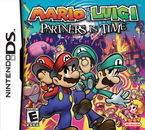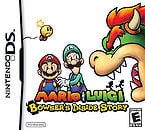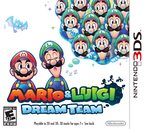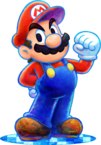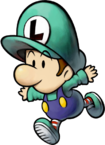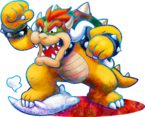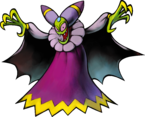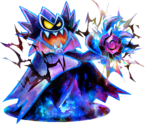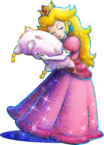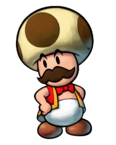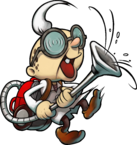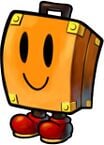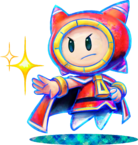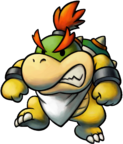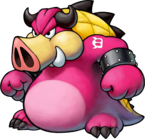Mario & Luigi (series): Difference between revisions
| Line 527: | Line 527: | ||
**During the initial fights, Mario learns the action command while Luigi is occupied with something else (watching in ''Mario & Luigi: Superstar Saga'', playing in ''Mario & Luigi: Partners in Time'', sleeping in ''Mario & Luigi: Bowser's Inside Story'', and dreaming about the fight in ''Mario & Luigi: Dream Team''). | **During the initial fights, Mario learns the action command while Luigi is occupied with something else (watching in ''Mario & Luigi: Superstar Saga'', playing in ''Mario & Luigi: Partners in Time'', sleeping in ''Mario & Luigi: Bowser's Inside Story'', and dreaming about the fight in ''Mario & Luigi: Dream Team''). | ||
**In all four games, at least two other versions of Bowser must be battled (Rookie and Bowletta in ''Mario & Luigi: Superstar Saga''; Baby Bowser and Shrowser in ''Mario & Luigi: Partners in Time''; Bowser X and Dark Bowser in ''Mario & Luigi: Bowser's Inside Story''; Bowser possessed by Antasma, Giant Bowser, and Dreamy Bowser in ''Mario & Luigi: Dream Team''). | **In all four games, at least two other versions of Bowser must be battled (Rookie and Bowletta in ''Mario & Luigi: Superstar Saga''; Baby Bowser and Shrowser in ''Mario & Luigi: Partners in Time''; Bowser X and Dark Bowser in ''Mario & Luigi: Bowser's Inside Story''; Bowser possessed by Antasma, Giant Bowser, and Dreamy Bowser in ''Mario & Luigi: Dream Team''). | ||
**All four games have at least one boss that only gives the player a limited number of turns to defeat before [[Game Over]]. The bosses are: [[Roy Koopa]], [[Wendy O. Koopa]], and [[Larry Koopa]] in ''Superstar Saga'', three [[Shroobs]] in [[Hollijolli Village]], and [[Elder Shrooboid]] in his larger form in ''Partners in Time'', [[Fawful Express]] and X bosses in ''Bowser's Inside Story'', and [[Heavy Zest]] and X bosses in | **All four games have at least one boss that only gives the player a limited number of turns to defeat before [[Game Over]]. The bosses are: [[Roy Koopa]], [[Wendy O. Koopa]], and [[Larry Koopa]] in ''Superstar Saga'', three [[Shroobs]] in [[Hollijolli Village]], and [[Elder Shrooboid]] in his larger form in ''Partners in Time'', [[Fawful Express]] and X bosses in ''Bowser's Inside Story'', and [[Heavy Zest]] and X bosses in ''Dream Team'' (though the X Bosses and Heavy Zest do not give a Game Over, rather they are just pulled away from the battle). | ||
**In all four games, there is at least one Wiggler-esque boss. | **In all four games, there is at least one Wiggler-esque boss. | ||
**In all four games, an altered form of Bowser is the final Boss (Bowletta, Shrowser, Dark Bowser, and Dreamy Bowser). | **In all four games, an altered form of Bowser is the final Boss (Bowletta, Shrowser, Dark Bowser, and Dreamy Bowser). | ||
Revision as of 20:44, October 24, 2013
Template:Series-infobox The Mario & Luigi series (Mario & Luigi RPG, マリオ&ルイージRPG in Japan) is a quadrilogy of Role Playing Games developed by AlphaDream for Nintendo's handhelds, starting in 2003 with Mario & Luigi: Superstar Saga for the Game Boy Advance. Each title has Mario and Luigi team up for a meandering quest in which they must battle evil, all the while completing various and often banal side-quests. More playable characters were introduced in the second and third Mario & Luigi games. The series is renowned for its inventive plots and humorous dialogue and is notable for maintaining continuity between the four installations.
History
| Title, Original Release and System | Synopsis and Ratings |
|---|---|
| Mario & Luigi: Superstar Saga
|
The first game in the series was Mario & Luigi: Superstar Saga, released in 2003 for the Game Boy Advance. In the game, two new villains, Cackletta and Fawful, steal Princess Peach's voice. Mario and Luigi, of course, jump into the action and travel to the Beanbean Kingdom to stop them. It is later found out that Cackletta had stolen Peach's voice to awaken the Beanstar, a powerful star that can grant all wishes, such as letting Cackletta rule the world, that is awakened by a pure voice. Princess Peach happened to be the one with the "Pure" voice. |
| Template:Releasedate Game Boy Advance | GameSpot - 9.2 • MetaCritic - 90 |
| Mario & Luigi: Partners in Time
|
A sequel to Superstar Saga was made for the Nintendo DS in 2005, called Mario & Luigi: Partners in Time. This game centered on the Mushroom Kingdom of the past, during the invasion of an alien race known as the Shroobs. Unaware of the danger, Princess Peach uses a Time Machine built by Professor E. Gadd to travel into the past, where she was promptly captured by the alien leader, Princess Shroob. Teaming up with Baby Mario and Baby Luigi, the adult Mario bros. set off to defeat the Shroobs and save Peach, using Time Holes created by the malfunctioning Time Machine to travel back and forth through time. |
| Template:Releasedate Nintendo DS | GameSpot - 8.9 • IGN - 9/10 • MetaCritic - 8.6 |
| Mario & Luigi: Bowser's Inside Story
|
The third installment, Mario & Luigi: Bowser's Inside Story, was announced at Nintendo's Fall Press Conference on October 2nd, 2008.[1] While Mario and Luigi are still playable, Bowser becomes the central protagonist in this game as he attempts to reclaim both the Mushroom and Koopa Kingdoms from Fawful, who used an outbreak of a disease known as the Blorbs as an opportunity to launch his own evil plot for world domination. Fawful later gives Bowser a Vacuum Mushroom, making Bowser inhale everything around him, including Mario, Luigi, Princess Peach, and other characters. |
| Template:Releasedate Nintendo DS | GameSpot - 9.0 • IGN - 9.5/10 • MetaCritic - 90 |
| Mario & Luigi: Dream Team
|
The fourth installment, Mario & Luigi: Dream Team, was announced during February 14, 2013's Nintendo Direct.[2] Due to the shift to 3D, the game uses a new art style. In this game, Mario, Luigi, Pincess Peach and Toadsworth go on a trip to Pi'illo Island, where the Bat King Antasma have turned many residents into stone, and kidnaps Peach. In order to save the Pi'illo Island folk and the princess, Mario must explore both the real, tridimensional world, and the side-scrolling world in Luigi's dreams. |
| Template:Releasedate Nintendo 3DS | (Unavailable) |
Appearances of the Series
Super Smash Bros. Brawl
Artwork from the Mario & Luigi series appeared as stickers in Super Smash Bros. Brawl: Cackletta, Luigi with Baby Luigi, Luigi, Mario with Luigi, Prince Peasley, a Shroob, Stuffwell, and Toadsworth. Additionally, one of the random names in Brawl when naming something (for example, naming a friend code) is FWFUL, obviously referencing Fawful. Additionally, Gritzy Desert's music from Mario & Luigi: Partners in Time is selectable as the Mushroomy Kingdom's stage music.
Major Elements of the Mario & Luigi series
Major Characters
Protagonists
| Character | Brief Biography | First Appearance |
|---|---|---|
| Mario
|
Mario, with his brother, as the series name suggests, is the star of the series. When there is trouble, Mario attempts to solve the problem as quickly as he can, dragging Luigi alongside him. In this series, Mario is a very famous hero, being well-known in various lands. As in most Mario games, Mario is a silent protagonist, but he communicates by body movements and speaking in Italian. | |
| Luigi
|
Luigi is Mario's younger, lesser-known brother. He often gets dragged into adventures beyond his will. Luigi is more cowardly and more hesitant than Mario, but he is willing to help solve any trouble that has arisen. Luigi's clumsy antics are usually comic relief, but it can be sometimes dangerous, including when he left Baby Luigi alone to Petey Piranha in Mario & Luigi: Partners in Time. Luigi does not speak either in this game, communicating similarly to Mario; only in Dream Team do Luigi's thoughts take the form of words, and this only happens in a area known as Dream's Deep, and whenever he becomes a giant. | |
| Baby Mario
|
Mario and Luigi encounters Baby Mario and Baby Luigi in their adventures in Mario & Luigi: Partners in Time. Similar to Mario, Baby Mario often jumps ahead when a problem rises. Baby Mario is impulsive at times, unlike Mario, including when he uses his hammer in misbehavior. | |
| Baby Luigi
|
Much like Luigi, Baby Luigi is a more timid brother than Baby Mario. In Mario & Luigi: Partners in Time, he is easily frightened, and he frequently cries in troublesome situations. Baby Luigi has shown to be key to destroying the Shroobs in Mario & Luigi: Partners in Time when he reverted characters to normal with his tears. He is also shown to know that an object has bad vibe, such as crying at the Cobalt Star because it contains the Elder Princess Shroob inside it. |
Antagonists
| Character | Brief Biography | First Appearance |
|---|---|---|
| Bowser
|
Bowser has appeared in various roles in the Mario & Luigi series. Unlike in most Mario games, Bowser aided Mario and Luigi in reaching the Beanbean Kingdom in Mario and Luigi: Superstar Saga, but after the crash landing, Bowser unintentionally became a rival, being used first by Popple as a minion and then by Cackletta as a body to posess. In Mario & Luigi: Partners in Time, Bowser is mainly an antagonist, teaming up with Baby Bowser to fight Mario and causing trouble by kidnapping 'Princess Peach' (later revealed to be a disguised Princess Shroob). He is manipulated once again when he is turned into Shrowser by the Elder Princess Shroob. Bowser is the primary protagonist in Mario & Luigi: Bowser's Inside Story, with Mario and Luigi adventuring inside him after he inhales the Vacuum Mushroom. Mario & Luigi: Dream Team sees Bowser himself pose a serious threat as the main antagonist, making an alliance with Antasma to rule the world by using the Dream Stone, but was secretly just using Antasma and later betrays him to keep the Dream Stone's power for himself. | |
| Cackletta
|
Cackletta is the primary antagonist in Mario & Luigi: Superstar Saga. She and Fawful had stolen Princess Peach's voice. She has also caused trouble in Beanbean Kingdom by transforming Queen Bean into a giant beast and stealing the Beanstar. After Mario and Luigi defeated her, Fawful took her soul and placed it into Bowser's body, transforming Bowser into Bowletta. | |
| Fawful
|
Fawful is Cackletta's servant. He speaks in Engrish and uses many food-related metaphors. In Mario & Luigi: Superstar Saga, he steals Princess Peach's voice and helps transfer Cackletta into Bowser. In Mario & Luigi: Partners in Time, Fawful plays more of a supporting role. He runs an underground badge shop the Baby Mario Bros. can access. Fawful plays as the main antagonist in Mario & Luigi: Bowser's Inside Story. He has usurped Bowser's Castle while creating an outbreak of Blorbs. He has also given Bowser the Vacuum Mushroom to aid him in his plot to rule Mushroom Kingdom. | |
| Shroobs
|
The Shroobs are an alien race that has invaded Mushroom Kingdom in the past. They have trapped Toads and extracted their vim to power their technology. They can shoot bolts transforming characters into Shroob Mushrooms. The Shroobs speak a foreign language that Mario and Luigi understand only later in the game. One of the Shroobs major weakness is baby tears. | |
| Princess Shroob
|
Princess Shroob commands the Shroob fleet during most of Mario & Luigi: Partners in Time, and is thus the game's main antagonist. When Princess Peach has traveled to the past, Princess Shroob manages to capture her, but not without Peach trapping the Elder Princess Shroob - the real leader of the shoobs - in the Cobalt Star. It is only after Princess Shroob is mortally wounded in battle that this is revealed, however. | |
| Antasma
|
Antasma is a nightmare and the former main antagonist of Mario & Luigi: Dream Team. He is behind the destruction of the Dark Stone and the freezing of the Pi'illos. Mario must enter Luigi's dreams in order to rescue Antasma's victims, which by the time Mario starts to enter Luigi's dreams include Princess Peach, whom Antasma abducts early in the game. He also teams up with Bowser, and the two villains later set their sights on the Dream Stone, which holds the power to grant any wish, but is later betrayed by Bowser, who reveals that he's been using Antasma. |
Supporting Characters
Protagonists
| Character | Brief Biography | First Appearance |
|---|---|---|
| Princess Peach
|
Princess Peach is usually a victim when trouble arises in Mushroom Kingdom. In all games, she is kidnapped at some point. Peach, however, is not entirely helpless, unlike in the mainstream Mario games, since she has provided help to the Mario Bros. such as warning the dangers of the Cobalt Star and later the Dark Star. | |
| Toadsworth
|
Toadsworth is Princess Peach's companion. He is often worrisome about Peach, especially if Peach decides to take a trip. Toadsworth provides help and advice to the Mario Bros. during their adventures. In Mario & Luigi: Partners in Time, Toadsworth's younger counterpart, Toadsworth the Younger allies with Toadsworth and attempts to take care of Baby Peach. | |
| Professor Elvin Gadd
|
Professor Elvin Gadd helps Mario & Luigi with his items and inventions. In Mario & Luigi: Superstar Saga, he gives them a special item after he samples a new drink. His time machine in Mario & Luigi: Partners in Time has helped Mario, Luigi, and Princess Peach travel to the past. E. Gadd has also invented the Hydrogush 4000 from an event in Thwomp Mountain, which is vital in defeating the Shroobs. | |
| Baby Peach
|
When Princess Peach was a baby, her castle is being attacked by both Baby Bowser and the Shroobs, with Baby Bowser attempting to kidnap her. When Baby Bowser has realized he lost to the Shroobs, he allows the Baby Mario Bros. and Toadsworth the Younger to flee. Baby Peach is taken to safety in the future Princess Peach's castle, with Toadsworth and Toadsworth the Younger taking care of her. | |
| Stuffwell
|
Stuffwell is a friendly talking suitcase, invented by Professor Elvin Gadd. He carries Mario and Luigi's items and can show the party's stats. His catchphrase is, "BACK TO ADVENTURE!" | |
| Starlow
|
Starlow is another supporting character that holds Mario and Luigi's items. She is one of the four Star Sprites shown in the game. She helps Mario and Luigi advance in their adventure by tutorials and advice. After Bowser inhales her, she tricks Bowser by calling herself "Chippy". Throughout the game, she has demonstrated irritation toward Luigi. She also appears in Mario & Luigi: Dream Team, where she is used in the Real World to interact with Luiginary Works in the Dream World. | |
| Prince Dreambert
|
Dreambert is the Prince of the Pi'illo people that helps Mario and Luigi in their adventures on Pi'illo Island. He aids them in the Dream World, helping them learn new moves to further advance deeper into Luigi's Dreams and information to aid them in their exploration. His main goal is to prevent Antasma from taking the Dream Stone and using it for malevolent reasons. His role is similar to Starlow and Stuffwell from the past games. |
Antagonists
| Character | Brief Biography | First Appearance |
|---|---|---|
| Popple
|
Popple is an independent thief that often crosses Mario and Luigi's tracks in Mario & Luigi: Superstar Saga. He has befriended Rookie, who is Bowser without his memory. Popple and Rookie cause trouble for Mario and Luigi multiple times, but they often end up getting beaten. When Popple loses Rookie, he teams with Birdo, with Birdo falling in love with him. Popple often ends his sentences with, "See?". | |
| Baby Bowser
|
Baby Bowser is a major antagonist in Mario & Luigi: Partners in Time. It is revealed that even as a baby, Bowser attempted to kidnap Princess Peach. During one invasion, however, the Shroobs interfere, and Baby Bowser loses his Cobalt Star Shard. Baby Bowser, with Kamek, follows the Mario and Baby Mario Bros., attempting to steal back the shard. | |
| Midbus
|
Midbus is Fawful's servant, guarding Bowser's Castle after Fawful has usurped it. Midbus fights Bowser three times in the game. Midbus is strong, but lacking in intelligence; he speaks in broken sentences. He often gives long names for weapons he uses. |
Other Characters
- Broque Monsieur
- Broggy
- Broque Madame
- Brickle
- Britta
- Elder Princess Shroob
- Kamek
- Kylie Koopa
- Lady Lima
- Prince Peasley
- Queen Bean
- Toad
- Toadbert
- Yoshi
- Pi'illoper
- Eldream
- Bedsmith
- Wiggly
- Private Goomp
- Corporal Paraplonk
- Sergeant Guy
- Lil' Massif
- Big Massif
- Dr. Snoozemore
- Smoldergeist
- Wisdurm
- Kuzzle
- Chakron
Gameplay Elements
The Mario & Luigi series features games on a turn-based RPG system. Enemies are encountered in the overworld, and the main protagonists, Mario and Luigi (and Baby Mario and Baby Luigi in Mario & Luigi: Partners in Time; and Bowser in Mario & Luigi: Bowser's Inside Story) can interact the enemy and enter into a battle scene. If they attack the enemy, they get a first-hit advantage by dealing damage with the enemy (or stunning the enemy if they use hammers), unless they jump on spiked or fire enemies. If the enemy hits the rear brother in Mario & Luigi: Superstar Saga, that rear brother misses the first turn, stunned and vulnerable to attack, unless he has a higher speed stat. This has changed in the next games, since enemies have to hit behind either of the two brothers to make them stunned.
In all four Mario & Luigi games, the Mario Bros., the Baby Mario Bros., Bowser and Mario and the Luiginoids can receive various new abilities to enter otherwise inaccessible spots. For instance, the Mario Bros. can use the High Jump ability to reach high areas.
In Battle, the Mario Bros., the Baby Mario Bros., and Bowser have various methods to attack the enemy. They have a basic attack or a special Bros. attack. In Mario & Luigi: Superstar Saga, the Bros. attack consumes Bros. Points (BP). In Mario & Luigi: Partners in Time and in Mario & Luigi: Bowser's Inside Story, items activate these attacks.
The Mario & Luigi series battle system also comes with the ability to avoid attacks by jumping, using a hammer, punching, and using the shell (the latter two that Bowser uses). Often, when facing against the Mario Bros., enemies signal which brother they will attack.
As in all Mario series RPGs, the characters have a choice to flee the battle, but by first attempting it.
Stats
As in most RPG games, each character has a different stat. When characters level up by earning enough experience points (or alternatively use special items made from beans in Mario & Luigi: Superstar Saga), their stats elevate. Players can decide which stat to add a bonus via roulette, but they should be aware that the numbers that boost the star will eventually decrease if consistently chosen.
Stats are also temporarily increased or decreased when peppers are consumed or from enemy attacks.
| Name | Description |
|---|---|
| HP | HP, or Health Points, is how much health the Mario Bros. the Baby Mario Bros., and Bowser have. If HP drops to zero, the brother faints. The fainted brother must be carried if the enemy attacks where he is, making it a slight liability with the battling brother. If all brothers or Bowser have no HP, then it is a game over. |
| SP | SP, or Special Points, is a stat found only in Mario & Luigi: Bowser's Inside Story. They are used when Mario, Luigi, or Bowser uses a Special Attack. They are very similar to Bros. Points. |
| BP | BP, or Bros. Points, allows Mario and Luigi to use Bros. Attacks in Mario & Luigi: Superstar Saga and Mario & Luigi: Dream Team. If Bros. Points are depleted or inadequate, Mario and Luigi cannot use certain Bros. Attacks. |
| POW | This stat indicates the Mario Bros., the Baby Mario Bros., and Bowser's offensive abilities. The higher the stat, the more damage they deal. |
| DEF | This stat indicates the Mario Bros., the Baby Mario Bros., and Bowser's defensive abilities. The higher the stat, the less damage they receive. |
| SPEED | A linear stat, Speed indicates how fast the characters are. Characters with the higher speed move first in battle. |
| STACHE/HORN | Stache, (or Horn for Bowser) is a unique stat. The higher the Mario Bros. have this stat, the more likely they can deal lucky hits, which deal double the damage. Also, the higher the stat, the bigger discount and bonuses the Mario Bros. can get at stores. In Mario & Luigi: Bowser's Inside Story, a higher Stache or Horn stat means a higher chance for winning in Scratch Card. |
Items
The series features many items. Items can be obtained if the characters hit blocks, win battles, win minigames, and others. Mario and Luigi can buy items at various shops with coins they earned in battles and blocks. Clothes and badges are earned usually as a prize while key items are needed to advance the storyline or complete a sidequest.
Consumable Items
| Image | Name | Description |
|---|---|---|
| Mushroom | Recovers 25 HP/20 HP/30 HP for the Mario Bros. | |
| Super Mushroom | Recovers 50 HP/40 HP/60 HP for the Mario Bros. | |
| Ultra Mushroom | Recovers 120 HP/80 HP for the Mario Bros. | |
| Max Mushroom | Recovers all HP/240 HP for the Mario Bros. | |
| Hot Drumstick | Recovers 80 HP for Bowser. | |
| Fiery Drumstick | Recovers 150 HP for Bowser. | |
| TNT Drumstick | Recovers 280 HP for Bowser. | |
| Mushroom Drop | Recovers 15 HP (all). | |
| Super Drop | Recovers 30 HP (all). | |
| Ultra Drop | Recovers 60 HP (all). | |
| Nut | Recovers 20 HP (each). | |
| Super Nut | Recovers 40 HP (each). | |
| Ultra Nut | Recovers 100 HP/80 HP (each). | |
| Max Nut | Recovers all HP/160 HP (each). | |
| File:Syrups.PNG | Syrup | Recover 20 BP/10 SP. |
| File:Syrups.PNG | Super Syrup | Recover 40 BP/20 SP. |
| File:Syrups.PNG | Ultra Syrup | Recover 100 BP/30 SP. |
| File:Syrups.PNG | Max Syrup | Recover all BP/40 SP. |
| File:Ultra Mushroom.PNG | 1-Up Mushroom | Revives a fallen brother with half of his max HP. |
| File:Ultra Mushroom.PNG | 1-Up Super | Revives a fallen brother with all HP. |
| Refreshing Herb | Used to get rid of status ailments. | |
| File:Green pepper65.png |
Green Pepper | Boost DEF and/or get lighter. |
| File:MLSuperStarSagaREDPEPPER.png |
Red Pepper | Boost POW and/or weight. |
| Blue Pepper | Raises SPEED. | |
| Golden Mushroom | Recovers Max HP and BP. | |
| Star Candy | Recovers 999 HP and SP; most likely all HP and SP, similar to the Golden Mushroom. | |
| File:Retry Clock.PNG | Retry Clock | Allows a player to restart a battle after failure. |
Beans
Beans are consumable items found in all Mario & Luigi games, but in Mario & Luigi: Superstar Saga, special beans are found, and they can be blended in the Starbeans Café. The drinks made from a blend of these beans can increase stats. In Mario & Luigi: Partners in Time, beans are used to buy badges. In Mario & Luigi: Bowser's Inside Story, and in Mario & Luigi: Dream Team, beans are used to increase stats.
| Image | Name | Description |
|---|---|---|
| Woo Bean | Woo Beans are usually found by defeating certain enemies, some with the Game Boy Horror SP pin. They are also earned in the surfing minigame. | |
| Hoo Bean | Hoo Beans are found in hidden treasure chests. They are also earned in the surfing minigame. | |
| Chuckle Bean | Chuckle Beans are found when Luigi digs up X marks on the ground. They are also earned in the surfing minigame. | |
| Hee Bean | Hee Beans are found when Mario and Luigi win certain minigames. | |
| Woohoo Blend | Created from brewing 25 Woo Beans, the Woohoo Blend gives 4 HP to the brother that uses it. | |
| Hoohoo Blend | Created from brewing 25 Hoo Beans, the Hoohoo Blend gives 4 BP to the brother that uses it. | |
| Chuckle Blend | Created from brewing 25 Chuckle Beans, the Chuckle Blend gives 4 SPEED to the brother that uses it. | |
| Teehee Blend | Created from brewing 25 Hee Beans, the Teehee Blend gives 4 STACHE to the brother that uses it. | |
| Hoolumbian Blend | Created from brewing 15 Woo Beans and 10 Hoo Beans, the Hoolumbian Blend gives 4 POW to the brother that uses it. | |
| Chuckoccino Blend | Created from brewing 15 Woo Beans and 10 Chuckle Beans, the Chuckoccino Blend gives 4 DEF to the brother that uses it. | |
| Teeheespresso Blend | Created from brewing 15 Woo Beans and 10 Hee Beans, the Teeheespresso Blend gives 6 to a random stat to the brother that uses it. | |
| File:Bean.png | Heart Bean | Increases health by 1 Point. |
| File:Bean.png | Special Bean | Increases special points by 1 Point. |
| File:Bean.png | Power Bean | Increases power by 1 Point. |
| Heart Bean DX | Adds 3 points to max HP. | |
| Bros. Bean | Adds 1 point to max BP. | |
| Bros. Bean DX | Adds 3 point to max BP. | |
| Power Bean DX | Adds 3 points to POW. | |
| Defence Bean | Adds 1 point to DEF. | |
| Defence Bean DX | Adds 3 points to DEF. | |
| Speed Bean | Adds 1 point to SPEED. | |
| Speed Bean DX | Adds 3 points to SPEED. | |
| Stache Bean | Adds 1 point to STACHE. | |
| Stache Bean DX | Adds 3 points to STACHE. |
Badges
Badges can be equipped on the playable characters to give them extra effects or more power in battle. Badges are bought in shops, earned as prizes, or found in defeated enemies. Characters can equip only one badge at a time. In Mario & Luigi: Bowser's Inside Story, only the Mario Bros. can equip badges. The badges are part of a gauge that fills when an action command is executed well. When the gauge is filled, the Mario Bros. can use various actions including healing themselves.
![]() For a full list on badges, see here
For a full list on badges, see here
Clothing
The main protagonists can also equip clothing to increase stats, such as DEF, HP, and SPD. Clothes can be bought at shops, earned as prizes, or found in defeated enemies. Some clothes are exclusive to Mario while only Luigi can wear others; some clothes are compatible with both. In Mario & Luigi: Superstar Saga, clothes can provide extra effects. In Mario & Luigi: Bowser's Inside Story, clothes received additional types including overalls, gloves, socks, boots, and accessories for Mario and Luigi, and shells, arm bands, rings, and fangs for Bowser. Characters can equip more clothing if their rank go up (the maximum is three), but they can equip only one of each type.
File:ML Overalls.png For a full list on clothing, see here.
Similarities Between the Games
- The Mario Bros. have been inside someone's body in the first three games (Bowletta's belly in Mario & Luigi: Superstar Saga, Yoob's belly in Mario & Luigi: Partners in Time and Bowser's and a giant Sockop's body in Mario & Luigi: Bowser's Inside Story).
- All of the games are mainly set somewhere other than the Mushroom Kingdom of the present (Beanbean Kingdom in Mario and Luigi: Superstar Saga, the Mushroom Kingdom of the past in Mario & Luigi: Partners In Time, Bowser's body in Mario & Luigi: Bowser's Inside Story and Pi'illo Island and Dream World in Mario & Luigi: Dream Team).
- All four games have Bowser. (As the helper in "Superstar Saga", a boss in "Partners In Time", a playable character in "Bowser's Inside Story", and the main antagonist in "Dream Team")
- All four games have their own version of the Mushroom Kingdom enemies (Mario & Luigi: Superstar Saga have bean-related enemies, Mario & Luigi: Partners in Time have Shroobified enemies, Mario & Luigi: Bowser's Inside Story have Fawful-themed, organ-themed and Dark Star-themed enemies, and Mario & Luigi: Dream Team have Antasma-themed and dream-themed enemies.
- The first three games have similarities between the boss fights, starting with the fact that Bowser is always the first boss.
- During the initial fights, Mario learns the action command while Luigi is occupied with something else (watching in Mario & Luigi: Superstar Saga, playing in Mario & Luigi: Partners in Time, sleeping in Mario & Luigi: Bowser's Inside Story, and dreaming about the fight in Mario & Luigi: Dream Team).
- In all four games, at least two other versions of Bowser must be battled (Rookie and Bowletta in Mario & Luigi: Superstar Saga; Baby Bowser and Shrowser in Mario & Luigi: Partners in Time; Bowser X and Dark Bowser in Mario & Luigi: Bowser's Inside Story; Bowser possessed by Antasma, Giant Bowser, and Dreamy Bowser in Mario & Luigi: Dream Team).
- All four games have at least one boss that only gives the player a limited number of turns to defeat before Game Over. The bosses are: Roy Koopa, Wendy O. Koopa, and Larry Koopa in Superstar Saga, three Shroobs in Hollijolli Village, and Elder Shrooboid in his larger form in Partners in Time, Fawful Express and X bosses in Bowser's Inside Story, and Heavy Zest and X bosses in Dream Team (though the X Bosses and Heavy Zest do not give a Game Over, rather they are just pulled away from the battle).
- In all four games, there is at least one Wiggler-esque boss.
- In all four games, an altered form of Bowser is the final Boss (Bowletta, Shrowser, Dark Bowser, and Dreamy Bowser).
- On that note, two of the final bosses (Cackletta in Superstar Saga and Fawful in Bowser's Inside Story) are fought inside Bowser.
- In all games starting with Partners in Time there is a boss that has more HP than the final boss.
- All four games have one character that is stuck and needs help, but as soon as they are rescued, something bad happens. In Superstar Saga, Bloat is stuck in a gap, and after he is rescued, the S.S. Chuckola starts to move out to the Oho Ocean, and sinks. In Partners in Time, the Hollijolli Mayor is stuck in a chimney, and after he is rescued, Shroob UFOs come and kidnap him. In Bowser Inside Story, Bowser is stuck in a hole on the floor in Bowser's Castle after eating too much food. After he falls down from the hole, he soon catches on fire and is bombed to Underground Tunnel by a great number of Bob-ombs, In Dream Team, Brickle gets stuck in the Mushrise Park fountain. As soon the bros frees him by adding more water pressure, the fountain shoots and lands on Grobot which then goes out of control.
- All four games' storyline is about collecting the pieces of a Star or another magic item (the Beanstar in Superstar Saga, the Cobalt Star in Partners in Time, the Star Cure/Miracle Cure in Bowser's Inside Story and the Ultibed in Dream Team).
- The Final Bosses of all four games are defeated by eliminating parts of the bosses' body to conceal a weak point: Cackletta's arms and her head must be destroyed to make attacking her heart possible, the Elder Princess Shroob's tentacles must be destroyed to conceal her crown, which after being de-activated will drop the boss's defense, the Dark Fawful Bug needs its arms, legs and glasses to be destroyed so the player can attack the Dark Star Core, and Dreamy Bowser needs his arms to be destroyed before he himself can be attacked.
- All four Mario & Luigi games have an elite version of an enemy. In Superstar Saga, there is an elite version of the Troopea called the Elite Troopea; in Partners in Time, there is an elite version of a Boom Guy called the Elite Boom Guy; in Bowser's Inside Story, there was an elite version of the Goombule called the Elite Goombule; in Dream Team the word "elite" isn't used, but there are many "R" versions of enemies. Also, the Elite Trio is fought including Sergeant Guy, Corporal Paraplonk, and Private Goomp.
- All games have the bosses exploding, and the enemies disappearing or a small explosion.
- All four games in the series start somewhere in Princess Peach's Castle.
- All four games' last area to explore is in a castle.
- In the first three games, The main antagonist takes over Peach's and/or Bowser's Castle in the game. In Superstar Saga, Bowletta takes over Bowser's Castle. In Partners in Time, Princess Shroob takes over Peach's Castle of the past. In Bowser's Inside Story, Fawful takes over both castles.
- All four games have at least two new characters with at least a different speech patterns or language. Superstar Saga has Fawful's odd metaphors and Cork and Cask's French accents, and also Popple's slang. Partners in Time features the Shroob language and Kylie Koopa's slang. Bowser's Inside Story had Midbus with his broken, poor English, the Emoglobin's odd vocal patterns, and Broque Monsieur's French accent. And in "Dream Team" Broque Monsieur and Kylie Koopa return and Hooskis language with "hoo" in it, Li'l Massif and Big Massif's Russian accents and words with "beef" in it, Popple's slang again and as well as Antasma's Slavic accent.
- All four games have a move where the player can spin or drill into the ground.
- All 4 games have their host system appear in the game somewhere (a purple and then a yellow Game Boy Advance is used as a message device by Bowletta in Mario & Luigi: Superstar Saga, the DS Radar - actually a grey Nintendo DS - is used by E. Gadd as well as a DS used by the Shroobs to call other Shroobs in Mario & Luigi: Partners in Time, Dark Fawful uses a red Nintendo DSi to pursue the Dark Star in Mario & Luigi: Bowser's Inside Story), and a giant 3DS is seen as a computer used by a Shelltop in Pi'illo Castle in Mario & Luigi: Dream Team.
- Final Bosses in all four games have some form of HP recovery moves - Dark Star Core is the only final boss who lacks HP recovery moves, while he recovers Dark Bowser by 1,000 HPs.
- Fawful appears in the first three games (As Cackletta's assistant in Superstar Saga, as a badge dealer under Princess Peach's Castle in Partners in Time, and as the main antagonist in Bowser's Inside Story).
- All four games plays a remix of the Super Mario theme.
- All four games have the same sound effects similar to Super Mario Bros..e.g Jumping and Fireball sound effects.
- When Mario & Luigi speak in all four games, they sometimes mention a type of Italian pasta as part of the gibberish.
- Each game, starting with Partners In Time has an antagonist from the previous installment.
- In all four games, a character disguises him/herself as Princess Peach; Luigi in Superstar Saga, Princess Shroob in Partners in Time, a strange, round creature from the Memory Banks turns into a blocky version of Princess Peach called Memory P(though it isn't really supposed to be a disguise)in Bowser's Inside Story, and Kamek in Dream Team.
- All four games has at least one or two brothers in danger/kidnapped where the other needs to save the brother. (In Superstar Saga, Mario falls into a Chuckola Cola barrel, then struck with Bean Fever where Luigi needs to save him while Luigi is taken by a crane and kidnapped by Popple to use as a hostage where Mario needs to save him. In Partners in Time, Both Mario and Luigi are kidnapped by brainwashed Hammer Bros., where Baby Mario and Baby Luigi need to save them. In Bowser's Inside Story Luigi is stuck in an immune cell only to be saved by Mario, and later Mario is kidnapped by a Sockop for his energy to be taken, only to be saved by Luigi. In Dream Team Luigi is sent into an unnatural sleep by the Dreambeats and Mario needs to defeat Dreamy Mount Pajamaja to wake him up, and Luigi's fear of losing Mario is what allows Dreamy Luigi to turn into Giant Luigi to save Mario.
- The first three games have Mario and Luigi saying "Let's-a-go!" and "Okey-dokey!" respectively at the start of a battle.
- In games after Superstar Saga Mario and Luigi have a partner that store their items, give tutorials, and also speak in Mario and Luigi's stead.
- They also all hide in Mario's pocket.
- In all four games the heroes meet a friendly character who reappears in the many different areas they explore. Prince Peasley in Superstar Saga, Kylie Koopa in Partners in Time, Broque Monsieur in Bowser's Inside Story, and Big Massif in Dream Team.
- With the exception of Broque Monsieur, they all lend a hand when the bros. are in danger at one point: Prince Peasley defeats Fawful when he has the upper hand, Kylie disguises herself as a Shroob to save them from getting executed by them, and Big Massif with his brother helps Mario and Luigi scale up Mount Pajamaja.
- In the first and fourth games in the series, Mario and Luigi have to escape a castle before it collapses. Also, someone flies them to safety (In Superstar Saga Blablanadon in Dream Team Zeekeeper).
- The second, third, and fourth games have a main gameplay element that is science-fiction related: time traveling in Partners in Time, journeying throughout someone's body in Bowser's Inside Story and entering the Dream World in Dream Team.
- A portrait of Princess Peach appears somewhere in all four games: in Mario's Pad in Superstar Saga, in Peach's Castle in Partners in Time, inside a Toad House in Bowser's Inside Story, and as part of a trading quest in Dream Team.
References
Template:BoxTop Template:ML:SS Template:ML:PIT Template:ML:BIS Template:ML:DT
